
I’ve had choices since the day that I was born,
There were voices that told me right from wrong.
If I had listened, no, I wouldn’t be here today,
Living and dying with the choices I’ve made.
George Jones, lyrics
_________________
I hadn’t thought about the man in years. There was no reason to, really. He had moved with his family from Daviess, I don’t know, probably sixty years ago. To a level of the Amish world way lower than ours. And we never got to see that much of him. In the few rare times when our families stopped by each other’s place to visit, we looked at him with a good deal of fascination. He was my father’s older brother. And we called him Uncle Ezra.
Well, we called him by other descriptive names, too. Everybody gets a nickname, that’s written in the Wagler code of laws somewhere. The one I remember for Uncle Ezra is “Cave Man.” He was a good-sized man, like my father. But it was his hair that we stared at. It waved in long oily coils. Waved way down his back, down almost to his shoulder blades. And he had that big bushy beard. He always wore a flat wide brimmed hat. I don’t remember ever seeing him smile much. Not saying he didn’t. Just that he always looked pretty grim, whether I saw him in his world or my own.
And there would be little reason to remember much of who he was, because he was pretty much a stranger to me. But that changed, a few weeks back. In rather dramatic fashion. Right there, when I was stretched out on the table in the LGH emergency room. When the doctor and his team were pretty convinced I was having a heart attack. They were swarming around, prodding and stabbing me with all sorts of needles. The doctor shot the questions, rat-a-tat. “Does your family have a history of heart problems?” No, not that I can think of, I said. Then I thought of it. Uncle Ezra. Yes, there was an uncle who died from a heart attack. “When?” I don’t know, back in the eighties sometime. “How old was he?” I don’t know, probably in his sixties. And from that little exchange, the memories stirred in me later. And I got to thinking. And then I got to writing.
He was born in Daviess in 1916, five years before my father came along. He wasn’t the oldest child, or even the oldest son. He was filled with all that Wagler piss and vinegar, and grew into quite the wild young man. Got into all sorts of mischief. He was a wild son. I’ve always found it hard to connect the stories of his youth with the grim bear of a man I saw when he came around. And, oh, yes, those stories were told, mostly in hushed tones, of who he was when he was young.
He didn’t listen very well to his parents. And I’m not being critical, here. Lord knows I didn’t listen very well to mine, either, when I was young. I’m not talking down at anyone. It’s just a story. He was pretty wild. He insisted on cutting his hair way short and shingled. They could never figure out where the boy was getting his hair cut. He never got to town much, and didn’t have money for such trifles when he did get there. And then one day someone walked into his bedroom. Somehow, he had forgotten to lock the door. And there sat Ezra, surrounded by mirrors, carefully snipping away, giving himself that verboten haircut. And thus he was caught. I don’t think that fazed him a bit, or that he quit cutting his hair the way he wanted it, even after that.
I don’t know how he looked, what his features were like in his youth. There are no pictures. He had the high-boned Wagler face, I think. Later you could never tell, because of his burly beard. And he ran wild, then, in Rumspringa. Back then, the youth didn’t tend to leave home, as me and my buddies did decades later. Daviess was a raggedy and uncouth place in those days. And their youth partied hard. And this story has trickled down through the years. Dad’s older brother, Noah, married Fannie Raber. I don’t know if Ezra didn’t particularly care for her, or what. But on the day of the wedding, he loudly made fun of Fannie’s dress. I can’t imagine what he was thinking, or why anyone would ever do such a thing. Fannie remembered that slight for the rest of her life. She muttered about it, way into her later years, when we’d come around. I guess she chose to hold onto that, and shouldn’t have. Ezra could have made it right, too. I don’t know if he ever did or didn’t, just that Fannie held on to that slight for as long as she lived. She died, just a year ago, or so. But back to Ezra. It’s always been a mystery to me, why anyone would make fun of the bride’s dress on her wedding day. He must have been dealing with some pretty deep emotional issues of some sort. That’s all I can figure out.
I don’t know when Ezra found the love of his life. It was there, in Daviess. A girl named Rosie. I have almost no memories of what she looked like. A buxom woman, as I recall. But that was after she had borne sons and daughters. And after they were married, the man truly settled down. At some point, then, he took a real hard turn to a real hard plainness, maybe to atone for all those sins of his wild youth. I’m not saying that had anything to do with it. But from here, I wonder.
Sons and daughters were born to them. Four sons, two daughters. And from what I’m told, it never was Ezra’s intention, to ever leave Daviess. He was pretty settled there, as he was. It was my Dad who was restless, and wanting to get out of there. And it was my Dad who wanted to go check out a rather plain community in Missouri. Bowling Green. So he bought a bus ticket, to go. And Ezra decided to go along, just for anyhow, and to keep my father company.
And the two of them headed out, to check the place out over a Sunday. Bowling Green is a fairly old settlement, for the Midwest. Not sure when it was founded, but at that time, it was rolling along pretty good. And I’m not saying anything disparaging about what the place is today. From what I hear, they’ve modernized a little bit. But back in those days, it was a cesspool, a hard-core lower end Amish settlement. Very plain. From when we visited when I was a child, I don’t recall that they had running water in the houses, even. I might be wrong about that. But it was hard-core, a place of low repute among the larger blue-blood settlements. Kind of like Daviess, maybe. But even worse.
Thankfully, Dad recoiled from the place. He was not impressed. I can never be grateful enough for that. Growing up in Bowling Green would have been a whole lot different than growing up in Aylmer and Bloomfield. I give Dad a lot of credit, for seeing what the place was. And for not moving there.
And strangely, Uncle Ezra, who only went along to keep Dad company, found himself drawn to the place. They traveled back home to Daviess. And in time, Dad moved his family to Piketon, Ohio. And Uncle Ezra and Rosie moved with theirs to Bowling Green. It boggles my mind, that he did such a thing. And again, I can’t help but wonder if the man was somehow trying to atone for his wild and wicked youth. He would suffer before God. Make life harder for himself. I may be off on a totally wild tangent, here. But something, some psychological pull, had to draw the man to such a plain and brutally austere place.
So they moved there, with their family. Eventually their sons took wives to themselves, good Bowling Green stock. And in time, Uncle Ezra was ordained as a deacon there, like his father was before him. It’s rare, for a Wagler of my direct lineage to be a preacher. My brother Joseph is pretty much an exception. But a deacon? That little job goes way back, generations.
The preachers are all to be feared, in any Amish settlement. But especially the deacon. He is the enforcer. When he comes knocking at your door, you can bet it’s not a social call. That kind of conditioning follows you all your life, if you come from the Amish. I still always have a brief, but intense rush of panic when my pastor, Mark Potter, suggests on a given Sunday that we get together for breakfast that following week. What did I do wrong, now? That’s the first, fleeting thought. And I always catch myself. He wants to get together for breakfast, not to chew you out, but because he just wants to get together for breakfast. It’s a pretty brutal thing, to come out of such a mindset. And from what little I’ve ever heard, Uncle Ezra fulfilled his role as deacon and enforcer quite efficiently. If people needed to be straightened out, brought back into line, or otherwise disciplined, he went and did it. That’s what he was ordained for.
And it’s kind of strange, in the Amish world. Well, I guess it’s that way in any setting. From an established settlement like Daviess, my father and a couple of his brothers emigrated to various places. And because of where they moved to and how they lived, their families rarely hung around each other. Ezra moved his family to a hard-core, plain Amish world. And I can’t say that I even know my first cousins. I wouldn’t know them if I met them. Because there was almost no crossing of boundaries, between their world and ours. And now Waglers are sprinkled throughout all kinds of really plain settlements in the Midwest. Ezra’s offspring. It’s still rare, that anyone from their world crosses over to the one I came from, or vice versa. Maybe for funerals, once in a while. But increasingly, not even for that. Not bemoaning anything, here. It’s just how it is.
Tragedy struck Ezra in 1973, when we still lived in Aylmer. He and his wife Rosie had traveled this state, to Snyder County, PA. And real early one morning, they got up to catch the bus in town. Ezra wanted to travel over here to Lancaster, to visit a few people he knew. And somehow, in the little town where they were to catch their bus ride, they had to cross the street. It was early and dark. Ezra looked, and the road was clear. He strode across, thinking Rosie was right behind him. And somehow, no one knows quite how it happened, she held back, and tried to cross back. She was struck by a car right on that spot. And killed instantly.
I remember hearing the news, there in Aylmer. And how my parents and others got ready and headed to Bowling Green for the funeral. Ezra was almost beyond consolation. A man of the hills, he had never trusted modern towns, or modern transportation. And now one of those modern places had claimed his wife. He wept and wept and grieved her.
Ezra never did have much use for my father’s writings. I don’t know if he allowed Family Life in his home or not. He wasn’t impressed by Dad’s fame at all. But the man got involved in a few little publishing ventures of his own. The main one that I remember was Die Botschaft. The Message. Ezra didn’t like The Budget, because a lot of people who wrote in that weekly paper came from car churches. He longed for something more pure, something where the car church people wouldn’t be allowed to participate. And somehow, he got it together, got all the principals lined up. I don’t know when exactly that happened. Late 70s, maybe. And Die Botschaft has been a success. It gets published every week, and no one from any car church writes for it. It’s totally for horse and buggy people. Ezra’s vision was a little different, from my father’s. But still, he had one, and followed through on it. You gotta respect that.
My father had a wanderlust. He moved from Daviess, to Piketon, to Aylmer, to Bloomfield. All in the span of about twenty-five years. Ezra didn’t wander quite that much. But still, he did move out of Bowling Green, to pursue one last vision that would fail. I guess he finally saw it, that Bowling Green was not a good place for any man to plant his roots. And he dreamed of starting a new community. Just him and his sons and daughters and their families. And a few hangers-on. And again, I’m not exactly sure of the exact date, when it happened. Late 70s, early 80s, near as I can tell without doing a whole lot of specific research.
And Uncle Ezra was the founding patriarch of a new little community in Prairie Home, Missouri. He and his sons bought farms there, and settled in. My sister Rachel recalls that some in our family traveled over to help for a few days, to build Ezra’s house. I don’t know what all the rules were, in Prairie Home. But it was an extremely plain settlement. From out of one frying pan, right into another, that’s where Ezra tumbled. I look at who he was, and what his hopes and dreams were, and my heart feels for the man.
Prairie Home was an unmitigated disaster, right from the start. The strong Wagler blood stirred in Ezra’s sons, and they took to squabbling with each other. The plainer the community, the sillier the squabbles, usually. I don’t know a whole lot of details, or a whole lot of specific stories. And if I did, I probably wouldn’t write them. They’re not important. The specifics rarely are. It’s the condition of people’s hearts that really matters.
And here we get to where I was always going, in this story. The thing that was triggered in me, there in that brutal emergency room at LGH. At some point right along in here, Uncle Ezra developed a serious heart condition. It was the plumbing. His veins were clogged up. He went and took all sorts of tests, and the doctor told him. “It’s serious, Ezra. You really need to let us go in and clean out those veins. If you walk out of here like this, you could easily keel over at any moment.”
And for whatever reason, Uncle Ezra just flat out rejected the doctor’s advice. I figure the man was just weary and half worn out and tired of life, missing his Rosie. He didn’t want to spend a whole lot of money, trying to hang on. And he chose to reject the doctor’s recommended treatments. I don’t know what he was thinking. I don’t know if he felt fear in his heart. Something tells me the man just made up his mind, and that was the way it was. If he lived, he lived. If he died, he died.
He did take some kind of natural treatment, to clear his veins. And it happened right while he was in Kansas City, taking those treatments. The stories claim that Ezra asked for a double dose of whatever it was they were shooting through him. And that double dose loosened the plaque in his veins. Might be hearsay. Might be true. But on December 16, 1983, the man went into a full blown heart attack in the clinic where he was taking treatments. And he died right there on the spot, there in Kansas City. He was sixty-seven years old.
I remember the day of the funeral. I didn’t go. I stayed home to be with Titus, and to do the chores, the milking and such. Eli Yutzy came over to help me. It was bitterly, bitterly cold. Snowing down, full blast. They took Ezra back to Bowling Green, and buried him beside his beloved Rosie. And those who were there still talk about how brutally cold it all was. How, at the graveside, the Bishop’s teeth were chattering so hard he could barely speak.
The little settlement he had founded in Prairie Home was in the process of blowing up when Ezra died. His sons all moved out soon after. A few other families hung on for another ten years or so. But the dissension that was rooted at the birth of the place would not go away. Today Prairie Home is an extinct settlement. As far as I know, no vestiges remain of Uncle Ezra’s little band of settlors. The people all scattered to the winds, moved to other places.
And so passed away the man who was my uncle, a man I barely knew. And yeah, from here, it might seem like he was a fool, to make the choices he did. He could have lived for another good ten to twenty years, had he just taken care of himself a bit. Made different choices. I don’t think he was a fool, though. I respect the right of any person to choose the conditions in which he will pass through this earth. Sure, I would have made different choices, from where I am. But he wasn’t where I am. And I’m not where he was.
That’s the blood I come from, right there. Stubborn, absolutely stubborn blood. Mildly unhinged, probably, with just a touch of madness. Waglers have held the reputation of being slightly mad for generations, at least the ones on the fringes. And I concur. We probably are. We live intensely. We feel things deeply. And mostly, it doesn’t matter much what anyone else says or thinks, we will always insist on walking our own paths. And we will live and die by the choices we make.
That’s who Uncle Ezra was, a man like that.
*******************************************
OK. A brief update on my heart situation. I don’t like the word “condition,” as in heart condition. So situation it is. After something like that comes down, it takes about a week to work out of freak-out mode. You’re all jumpy and touchy. I measured my pulse rate many times, just to make sure the heart was beating right. It always was. I went to work the first Monday morning, the Saturday after getting home. Sure, I was a bit tense and tired. But I figured I could sit home, all tense and tired. Or just go to work, and get done what I could. I haven’t missed a day of work since that two-day break at the hospital.
And it was really strange, that first week, to realize something. I used to get dog-tired by late afternoon into evening. Every day. It was that flutter heart, beating way out there. And I realized, during the afternoons, that I’m not nearly as tired as I was used to being. Not saying I’m not tired, in the afternoon at work. I am. But it’s not the dog-tiredness I was used to. I’m pretty happy about that.
The Coumadin and I are not getting along so well. And that’s by far the most depressing thing that came out of this whole ordeal. By far the most depressing. They got me penned in, taking that pharmaceutical rat poison. Right now, I’m on a pretty heavy daily dose, to get my body leveled out. The stuff makes me lethargic. I’m always cold. It hurts my stomach now and then. And it tends to make me drool, right out both sides of my mouth. And you don’t want to nick or bump into anything, because the cuts and bruises won’t go away. It’s pretty maddening. And no, I’m not pulling an “Uncle Ezra” and going off and ignoring the doctors. So don’t start squawking at me, all you medical people. I will have my first full checkup sometime next month. At that point, I figure I’ll tell the doctor exactly what I think of it all. There has to be a better, more natural way, without all those disastrous side effects. There has to be.
And, of course, since I can’t take my Superfood like my body’s been used to, I came down with a full fledged deep chest and head cold this week, complete with a savage hacking cough. With Superfood, I’d get maybe one cold a year. Sometimes not even that. Well, here’s the first one without it. I’m on Maximum Strength Mucinex 24 hours a day, or I wouldn’t be breathing at all. Again, it makes me crazy, how you can’t take natural things to help your body, because the Coumadin people tell you not to. And again. It’s maddening.
Last week, early, I texted my friend, Dwylin the plumber. Hey, think you can get over and get my softner system set up? He called right back. Yeah, he’d try to make it by late week. I knew he had good intentions. But the man is so overwhelmed with work that I half expected him not to show up. And last Friday morning, he texted me. He was there, in my basement, working. He never had time to be there, the first time, when I was in the hospital. But he took the time, because he’s my friend. And he came back as he’d promised, because he’s my friend. And he installed two new water heaters, one for me and one for the tenant. And the new softner system. The water heaters will pay for themselves in about a year or so, he told me. So now I won’t be heating any more water with all that expensive oil through my furnace.
It’s going to take a little chunk of change, to pay for all that. Funny thing is, the day before Dwylin showed up, my biannual royalty check arrived from Tyndale. I had planned on traveling a bit this summer, with some of that. And I still will. But a few of those planned trips just kind of went away, lately. They ain’t gonna happen. They never were gonna happen, they were always meant to be a mirage. It just took me way too long to figure that out. And now here’s the check. I figure after taxes, there should be just about enough to pay for the whole water system, and maybe I’ll have enough left over for a trip to Bloomfield this summer sometime.
I know I like to grumble now and then. But deep down, I also know this. The Lord provides, just as He always promised He would. And I am thankful.
Share

Suddenly he thought of Germany, and thought of it with
intense longing. Of all the countries he had ever seen,
that was the one, after America, which he liked the most,
and in which he felt most at home…It was also a country
above all others whose mystery and magic haunted him.
—Thomas Wolfe
_____________
I don’t know what it is, I grumbled to myself, that it always has to be like this. Just throw some stuff in a bag, and go with that. You don’t have to pack your entire wardrobe. Underwear, socks, a few shirts, some jeans, and maybe a pair of khakis and a jacket. Should be simple enough, for a two-week foray. Sadly, though, those little musings went right out the window the second I actually started packing for my trip.
I have a big old red suitcase on wheels, part of a set Ellen and I bought way back. She took the smaller pieces, and left me with the big one. And it’s always worked well for me on road trips. Throw in anything you think you might need, and that way you’ll have it with you. But this wasn’t a plain old road trip. This time, I was heading out on a jet plane. A large plane, to places I’d never even dreamed of seeing before. And since I was lugging the big red suitcase along, I might as well fill it.
I needed a carry-on bag, too. Keep a change of clothes and a few other necessities with you, in case the big bag gets lost. So the week before departure, I wandered into the mall to check out luggage prices. I was pretty horrified. Little carry-on’s with wheels ran right at $100 or more. No way I was going to pay that. Then good old TJ Maxx came through for me. A Chaps carry-on with a pull-out handle and rollers for fifty bucks. Sure, it was a deep burgundy color, but who cared? Burgundy and red was cool with me. Matching luggage has never been even remotely on my priority list.
I waited until Friday night to pack, the night before leaving. Stuffed in way too many shirts, my trusty old sports jacket, and a couple of shirt-jacs, and my black camo fleece jacket. I like to stay casual. It’s way more comfortable. Or maybe I’m just old and set in my ways. I packed my vitamins and my cold medicine. Still nursing my savage head cold, I went to bed late, my head buzzing from the cold meds. I tossed restlessly all night.
I woke up early, tense and nervous. This was the day. The day that was a long time coming. I was leaving for Germany. Setting out on a journey unlike any I had ever seen before. It was a big thing, in my mind. Still nursing my cold, I got up and followed my normal routine. Putzed around, ran down to Sheetz for coffee. Packed the last stuff in my bags. Fretted about what I’d forget. Departure time was 6:10 PM. And I left my home around One that afternoon. Drove over to Graber Supply, to park my truck there. A friend had agreed to run me to Philly, so I wouldn’t have to pay to park for two weeks at the airport.
He dropped me off at British Airways Departure gate shortly before 3 PM. And I walked into an airport to board a plane for the first time since Tyndale flew me out to Chicago back in 2010. I can do this, I thought. I will do this. The counter guy scanned my passport, tagged my luggage, and handed me my boarding pass. Directed me to security, where I knew they’d be waiting for me. The TSA thugs.
I approached them as a lamb. Whatever happened, I would take it. I would tell it later, too. My demeanor must have been sufficiently submissive, because they didn’t single me out. I did what they told me to do. Took off my shoes. Took everything out of my pockets, placed all my stuff in little tubs. Then stepped into a space-age booth and stood there, shoeless and beltless. Holding up my hands up to fit the profile on the glass. An utterly submissive citizen. No peep from me. They weren’t done, though. After passing through all that hassle with no trouble, one of the thugs on the other side approached me. Spoke. “I’m going to do a patdown,” he told me. OK, I said. He felt around my stomach a bit. Didn’t dig down, much further, with his hands. “You may proceed,” he said. So I did. As any good sheep would.
There’s a special law out there in the universe about me and planes. An obscure law, but one that always holds true on flights of over two or three hours. Wherever I sit, there will be a child within ten seats, more likely six. A child, anywhere from an infant to, oh, say, five years old. And that child will always have a voice. A great loud orator’s voice.
I crossed myself as I stepped onto the intercontinental jet, a huge tub of plane. The crowds slowly jostled through Business Class. I looked enviously at the broad expanse of space in those seats. It sure would be nice, to land up in one of those. But no, on back we went, through a curtain, to economy class. Rows and rows and rows of seats, tightly packed together. By some miracle, I landed up in an aisle seat. At least I could stretch my legs. And in front of me, three seats away to the right, the appointed flight orator was warming up. A four-year-old, probably. A tousle-headed little urchin with puffy lips. He was not happy at all. And he didn’t care who knew it. The great orators of history had nothing on this kid. Someday, he’ll probably end up in politics, which would be a sad waste of such a powerful, piercing voice.
I settled into my seat, beside a nice middle-aged couple. And the plane took off, right on time, right to the minute. Off we swooped, then up and up to 38,000 feet. It’s a different world in there, in that plane. Everyone is just so used to flying that no one thinks of the million little details that must connect and coordinate precisely to make it even possible. I thought of that, though. And it was just a strange flight, all around. First, they came trundling around with a little cart. Whiskey, wine, or beer. Take your pick. It’s part of the trip. No extra cost. I asked for scotch, and the nice man poured a little bottle of Johnny Walker Red into a plastic cup, added the ice I had requested, and handed it right over. This is wild, I thought. Very soon, another cart came trundling. Food, this time. A full meal, I forget what it was. Edible enough.
After that, we just settled in. I slumped in my seat. Dozed off. Jolted awake to the orator’s howls, now and then. A few hours passed. We had taken off in the evening, and flown into the night. And suddenly, it was dawn. Right outside the window, the sun was coming up. I glanced at my watch. It was around 1 AM, home time. I slumped back into my seat and slept. Off and on as the orator roared and roared again. They should have a special walled-off section for people traveling on planes with little children, I thought groggily. Why has no one thought of this before?
And right on time, we approached Heathrow Airport in London. That’s another “holy” place I’ve always wanted to visit. England. But I never got there yet. My time here would be brief. Just changing planes to my destination. A layover of just over an hour. It should be simple enough. Of course, it turned out to be far from simple. Heathrow is an evil, evil airport. I walked in cheerfully and quite innocently. How hard could it be, to change planes? The gate I needed probably was close by somewhere, I figured. I figured way, way wrong. It was a jungle, a minefield, that place. I looked for my boarding gate. No such number to be found. So I followed the signs. Downstairs, a crowd was gathering. I stood, forlorn and puzzled. A nice lady approached me, an airport employee. I told her where I needed to be, and she waved me toward the crowd. “Take the train,” she said. Train? In an airport? A minute or two later, the little train swept in. I packed myself into the crowd on the second car. The train bucketed along at frightful speeds for a few minutes, then slid into a station. I poured out with the crowd. Just walk. Go where they’re going.
Up a huge escalator and round about, we plunged into a big, big room, like a herd of stampeding cattle. There, people stood on point, glancing at every person’s ticket, and then directing them to the right place. I approached and showed my ticket to a balding bespectacled man. “Down that line,” he said in clipped tones, pointing. “But, no, wait. I’m putting you in the express lane.” Express lane. That sounded ominous. Am I in a time crunch, here? But faster is always better. Don’t ask questions. Just go. I shot through the crowds, up another escalator, and circled around to a security line. Security? I just got off a plane. Why more security?
There was no choice but to walk forward. At least you didn’t have to remove your shoes. I dropped my stuff into plastic tubs, including half a bottle of water I plucked from my shirt-jac pocket. The tall guard lurking nearby stirred and swooped in. “You cahn’t take this on the plane with you,” he barked accusingly, waving the bottle around in a most agitated manner. OK, OK. I waved dismissively. Throw it away, you blithering idiot, I thought to myself. Earn some of that colossal waste of funds we’re throwing at people like you to harass people like me. It’s water, for crying out loud. You know that as well as I do.
And then I was through, and followed the signs downstairs to my gate. A bus was parked outside, not a plane. I approached the young lady sitting at the station by her computer, a Muslim girl in full head covering. Timidly showed her my ticket. Am I in the right place? The English are often rude and thoughtless people. But this girl was not. She smiled and told me to have a seat. She would announce when it was time to board.
And she did, about twenty minutes later, after a small crowd had assembled. We all walked out and piled into the bus. The driver slid the bus along, on the left side of the road, and pulled up next to a small jet, parked way out on the edge of things. A stairs had been pushed up to the jet. We got off the bus and walked up the stairs onto the plane. Outdoors, like they used to do way back when commercial flying was in its infancy. That’s how Heathrow treated me. Primitive, that’s what that whole operation was.
It was a short flight to Hamburg, so of course no orator showed up. They never do, when it doesn’t matter. I felt tense and strange inside. This was the second leg of the journey, the short jaunt over. Next stop, Germany. The plane swooped down. We landed and bumped to a crawl. I had arrived. I walked into the airport and stood on German soil for the first time in my life. Exhausted and drained, I stared about me. The signs were all in German. Everyone around me spoke in German. A wild strange journey it had been, indeed, but here I was. It‘s been a long, long road from the horse and plow to this point, I thought. A long, long road.
Trundling along with the little burgundy carry-on, which turned out to be an excellent, excellent purchase, I followed the signs to Baggage Claim to find my big red suitcase. As inefficient as they were at Heathrow, I more than half expected it hadn’t made it. On the way over, I stopped at a little booth to show my passport to a nice man behind the glass. He glanced at my document, and welcomed me to Germany. That was real nice, I thought. Customs sure was simple, right there. I walked on out, and sure enough, Big Red was bumping along on the baggage belt. By some miracle, the Heathrow people had transferred it to the right plane on time. I grabbed it and followed the signs to the exit. Sabrina must be waiting. I was running a little behind. And just as I approached the exit, three stooges in uniforms accosted me with merry waves. Gleefully. “Hey, stop. We must inspect your bags.” I hadn’t cleared customs after all, according to these guys. And since I had no reason to doubt them, I followed them back into another room. I’m a sheep, I thought. At least as far as these guys will ever know, I am.
The head stooge was quite full of himself. Pompous and abrupt. How long would I be in the country? A week, I said. “Well, we must inspect your bags.” Go ahead, I said. I lifted Big Red onto the little table. Opened my suitcase. The Pompous One pawed through my stuff. Asked a few more inane questions. And found me harmless enough. “All right. Take your bags and go.” I took them and went. Buncha’ thugs, I thought grimly. I detest borders. All borders.
I walked through the exit, and there they stood. Sabrina and a colleague, Lynette. Sabrina introduced us to each other, and we trundled my bags out to the parking garage. Lynette had driven her car here to meet me. We chatted as we walked out. My head felt woozy. Yes, I had a good flight. I’m feeling a little strange, from the time change. I can’t believe I’m in Germany. I want to see what there is to see. I want to see the land.
We drove out of the city, through little villages on two-lane highways. German roads seemed quite normal. People drove on the right, just like back home. And just like that, it hit me. An overwhelming weariness. I hung my head and almost drifted off, as Sabrina and Lynette chatted and chatted right along. Here is such and such a thing. This area is known for thatched roofs on houses. They’re getting more and more scarce these days, because of the insurance. But those thatched roofs are out there, and we’ll see some.
Well, who wouldn’t stay awake for that? I roused myself. We puttered past fields and through village after village. The lay of the land reminded me of Lancaster County. Black rich fertile earth. It smells the same, wherever you are in all the world. German farms are very different from what I’m used to seeing. The buildings are clustered in little villages. Barns, houses, stockyards, chickens pecking about. Way back, the farmers clustered together like that for mutual protection. From their village buildings, they go out and till their fields. It’s quite unique, from what I’m used to. But I guess it works. They’ve been doing this for far longer than there were farms in my country.
We cruised along, and soon enough, Lynette pointed. There. And I saw it, for the first time in my life. A real thatched grass roof on a real house that someone lived in. It was surreal, that little road trip from the airport. It really was. My head drooped, now and then. Not wanting to be rude, I always pulled myself back. And then, just as I was sliding off into delicious sleep, we stopped and walked into an ancient church in a little village. And I came back from where I wanted to be, to see this sight. Wake up, and look around.
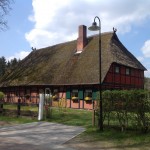
Thatched-roof house across from the old church.
A while later, the ladies dropped me off at a nice little hotel close to the University. Sabrina helped me check in, and I trundled off to my room on the third floor. A single room, they called it. Small, with half a bed. Nice enough, except for one thing. No wireless connection. Well, they had wireless, but they charged for it. And that’s my only grumble about the place. But it was what it was. I threw my bags against the wall and collapsed on the bed for a short nap. At six, Sabrina and her family showed up to take me out into the old town, and to find something to eat.
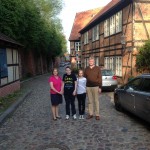
The Völz family.
They were all the same as I’d remembered them from last August. Hans-Jurgen, Sabrina, and their children, Maximilian and Emily. I sat up front and we headed out to old town Lüneburg. It’s a small city, way up in northern Germany. I’d never heard of it before. But like every city, town and village in the country, Lüneburg has its own rich, rich history. It was once an extremely wealthy town, because of its salt mines. Wars have been fought over salt. It was a critical component for curing and preserving meat. And the Lüneburg merchants grew fat and rich. The area is quite proud of its past.
We walked through the old town. I just couldn’t grasp it, the history of the place. This would be the case throughout the entire two weeks I spent in Europe. How old it is. Little churches and vast cathedrals and lots and lots of old houses dot the landscape, places far older than the country I live in. It’s hard, to process all that when you’re around it. To really grasp what you’re seeing. That first night, I stood by a surviving section of the thick old brick wall that once surrounded the town. That’s almost biblical, a walled town. It’s so strange, I told Sabrina and Hans Jurgen. All that material and effort to protect people from intruders who would attack and kill them. Humans are their own worst enemies.
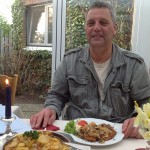
Schnitzel smothered with mushrooms. Excellent food.
We ate a little later, at a small bar and Gasthof. They wanted me to try the authentic German schnitzel, a flat, breaded pork product that reminded me of the tenderloin sandwiches I’ve eaten in small cafes in the Midwest. That, and fried potatoes, an old Amish staple. German food is heavy food. But delicious. And you must drink German beer with it. That’s pretty much a universal law in the country, near as I can tell. I’m not much of a beer guy, never have been. I drank more beer during my two-week trip than I have in the past five years, total. It was just part of the scene. And who am I to argue?
After dinner, Hans-Jurgen and Sabrina took me out to see the new home they had built about five years ago. A lovely house, designed to last a thousand years. I sat outside with them in the cool evening air, and we sipped one more beer and talked. They dropped me off at my hotel then, and I crept timidly up to my room on the third floor. I grumbled savagely to myself about the lack of wireless. Can’t check my email, or Facebook, so I might as well get some sleep. The bed was good and firm, and I quickly drifted off into fitful slumber. That was Day One. Tomorrow, the University.
The next morning, I awoke and got ready for the first day of the University adventure. Downstairs, in the hotel’s little restaurant, a great breakfast feast was spread out. One thing the Europeans got down is breakfasts in hotels. The tiniest rattiest place lays out hard-boiled eggs, three or four cheeses, plates of ham and and other sliced meats, a half dozen types of bread, granola and yogurt, and juice, and of course, strong black coffee. I’m not much of a breakfast guy, but who can turn down a spread like that?
Later, I drifted out through the courtyard and waited for someone to fetch me for the first class. The sidewalks swarmed with students, most of them on bicycles. The sidewalks there have designated bike paths, and these people whooshed back and forth and up and down with great abandon. Seemed like they would run right over you, if you didn’t watch your step. Time passed. I’m tense and nervous anyway, in strange settings like that, so I got a little tenser and a little more nervous. Come on, whoever was picking me up. That’s all I need, to show up late for my first speaking gig at a class, after all the trouble they went to, to get me over here. Time crept up, closer and closer to twelve. The class started at 12:15. Bicycles kept rushing by. Everyone knew where they were and where they were going. Except me. I stood there forlornly, clutching at my messenger bag strapped diagonally across my shoulder. I kept most of my money and my passport in that thing, and it stayed on or very close to me at all times. Lose it, and I’ll never make it back home.
I can only speak from where I was on this trip, and from what I saw. My first impression of the Germans around me was that they seemed rather dour and reserved. I didn’t see a whole lot of smiling going on. Maybe it’s those long, hard winters they have up this far north, I thought. And right then, she arrived. Julia, Sabrina’s student assistant. “Hi, you must be Ira,” she greeted me, smiling. I am, I said, smiling back. “Sorry, I’m running a bit late. We’re close to the classroom, though, so we’ll be on time.” We crossed the street and followed the bike path/sidewalks onto the University. I gaped around a lot. Great hordes of bikes stood parked in rows and rows. Hundreds and hundreds of them. Crowds of students strode purposefully about.
There wasn’t a whole lot of time to get nervous about speaking to a group of students in a foreign University, so I didn’t, mostly. When you’re walking through a door like that, stay who you are. Don’t try to be who you aren’t. But mostly, stay as calm as you can. We got to class a few minutes early, as Julia had promised. Sabrina met us and introduced me to her colleague, Maryann. Their classes would be combined today. They were all smiles. “The students are eager to hear you and meet you,” they both claimed. Yeah, yeah, I thought. Who’s eager to hear anyone lecture about much of anything? The room was packed out with probably about sixty students. Mostly young ladies, all of them quite beautiful, with a few guys scattered in here and there. I’m totally cool with that, though, speaking to roomful of beautiful women. I sat at a table up front. A few latecomers slipped in and sat at the back. All right, I thought. Here’s what I came for. Here we go.
Sabrina called the room to order, and introduced me. I saw that at least a few of the students clutched copies of my book. Wow. Maybe they really were eager to hear what I had to say, I thought. Sabrina’s introduction was quite long and quite complimentary. And then she turned to me. I smiled and thanked her. The students clapped a bit. And I just sat there and talked to them. When it comes to my book, and the Amish, I don’t have to prepare a lot. I know the subject matter.
And it was pretty much as it is back here at home, except for the location. American Studies in Germany are conducted in English. These students were all fluent in English. And I spoke to them in English. They looked at me as I spoke, focused on my words. And it seemed like Sabrina was right. They were eager to hear what I had to say. I’ve never been to Europe before, I told them. I’m excited and grateful to be here with you. You really have no idea how big a deal this is to me, to be here. It’s just flat out wild. My friends back home are quite in awe, as I am, too.
And then I spoke about where I came from, my childhood, and how it was to be raised Amish. A horse and buggy world, surrounded by modern society. And how it was to be torn from world to world as I left and returned and left again. About twenty minutes or so in, I read a passage from the book. And then I opened up for questions. I always like to do that, so you can talk about what people actually want to hear. And boy, did they have questions. Can I go home to see my family? Of course. How are my parents? Where is Sarah?
They grappled a bit with some of my answers. What do I think of the Amish now? I admire some the things they have preserved, like their work ethic. The West has lost that, mostly, now. What it is to really work. I deeply respect the culture, even though I could never, never live like that. That’s not the issue. To me, the issue is always freedom. I am free. The Amish should be free to live as they choose. To raise their children as they see fit. Who do the children belong to? I asked. The parents or the state? To me, it’s not even close. They belong to the parents. And if you tell me that Amish children don’t have much of a chance in life, I’ll tell you this. I was raised that way. It was really, really tough, to break away. But I did. I went on and got an education. Sure, I was older than the average student. But life’s not fair. People should be able to live freely as they choose, as the Amish live, if they want to. It’s none of my business what choices they make. As long as the freedom is there to make those choices.
This was a strange message, I think, to some of the students. Here I was, defending the people I had come from. When they knew from reading my book how I had almost lost my mind, breaking away. But that’s how I feel, and that’s what I told them. For true freedom to exist, there must be the ability to make free choices, even if the choices others make might be appalling to us.
Time flowed, and very soon, the hour and a half had passed. You’re welcome to bring your books up to sign, I said. And they lined up, those who had their copies with them. It all just seemed so surreal. Here I was, in a German University, signing copies of my book. And these people didn’t seem that reserved. They were very friendly, they stood there and smiled and smiled at me. And chatted and chatted, as well.
Afterward, Maryann took me to a nearby bakery, where we bought sandwiches and water and walked to a nearby park to eat. Like Sabrina and Lynette, Maryann was an expatriated American. She had lived in Germany for years, she told me. We chatted about a lot of things. She asked what all I’d like to see in Germany. I’m not going to make it, but I’d really like to see the city of Muenster, I told her. That place has some really dark Anabaptist history, the kind of stuff that was never taught to me. Because they were violent. I never knew that until after I was in college. I’d really like to go. But I guess I won’t make it.
After that first morning, things just came at me like a whirlwind. That evening, I spoke at a local high school, or Gymnasium, as they call it over there. A group of probably thirty or forty students and faculty. I’m always a little nervous, speaking to high school kids, because they tend to be unfocused. These kids were not. They locked right in as I talked, and actually came up with a good many very intelligent questions. After that was over, I signed a copy of the book I had brought along and donated it to the school library. And then a group of friends and faculty took me out to eat in old town Lüneburg.
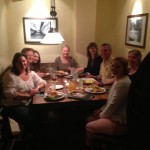
Pub meal on Monday night.
I sat there with them in a pub that was older than the country I was born in, and we just laughed and chattered like old friends. That night, I tried fresh German asparagus, or Spargal, as they call it. White asparagus. The short harvest season was in full swing, and farmers were selling their produce from little farm stands. My food was very good, especially to a guy who never has been much of an asparagus fan. Washed down with a large glass of beer, of course. The evening came to a close, then, and Sabrina dropped me off at my hotel. Tomorrow would be pretty open, except for the big talk scheduled for Tuesday evening. The big talk, the one they made the posters for, the one open to the public.
Sabrina’s colleagues all genuinely welcomed me, at least the ones in her immediate group in American Studies. In Germany, the academic levels are a little different than here. These ladies all had post graduate degrees, but I get confused as to exactly where they were in the pecking order. A Doctorate in Germany is not the top. You have to have something more, to call yourself a Professor. A Post-Doctorate Doctorate, maybe, or something like that. Whatever. These people were all quite friendly and insisted that I call them by their first names. They all teach classes in the American Studies Department at Leuphana. And I can’t say enough about how gracious and welcoming they all were. Every one. “We’re so glad you could come,” they claimed. You have no idea, I replied. You have no idea how big a deal it is for me to be here. To be invited like this. It’s just beyond anything I’ve experienced before.
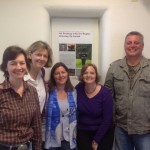
Sabrina’s gang, from Left: Lynette Kirschner, M.A.,
Dr. Maria Moss, and Maryann Henck, M.A.
The tension of that night’s talk pulsed inside me a good bit. But I pushed it back, mostly. I’ve spoken to large college audiences before, I told myself. The biggest crowd was at Grove City, last fall. You know your stuff. Don’t sweat it. But still, I felt it, the looming time, out there shadowing me like a ghost. This is Germany. These are German students. They’ll have high expectations.
Sabrina and her colleagues not only welcomed me, they insisted on showing me around the area. Ah, you don’t have to do that, I said. At least let me put some gas in your car. They wouldn’t hear of it, none of them. And that afternoon, Lynette was scheduled to show me about the town a bit. “The Salt Museum,” she suggested. “Would you like to see it?” Of course, I said. The Germans seem to have museums scattered about in every town, and even in some small villages. So early that afternoon, off we went. What could there be to see in a salt museum? Quite a bit, it turned out. Salt was the gold of the town for many centuries. Only in the 1980s was the mine finally shut down. The exhibitions were quite good.
After that, we took a walk about the old town. A certain section of Lüneburg is sinking, because of the mines below ground. Those streets have a lot of very old, very crooked houses. Lynette chattered on about the history of many of the places we walked past. The old houses were just fascinating status symbols of a time long ago. We also entered and toured an old church. Lynette filled me in on the story of the place. There are so many places and so many stories.
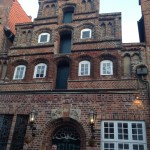
A typical home in the old town. A person with wealth built this home a long, long time ago.
And then it was back to the hotel. Evening approached. I changed into my khaki pants and jacket. Put on a long-sleeved shirt. Gotta be half presentable tonight, I figured. I had suggested that perhaps I could wear jeans and the jacket, since writers are generally considered weird anyway. No one cares how they’re dressed, and besides, jeans and jacket are quite presentable about anywhere, if you ask me. But Sabrina had kindly hinted that it might be good to dress up a notch from jeans that night. OK, I said. So I did.
Sabrina picked me up at six, and we drove over to the auditorium. Not a real large place, probably 175 seats or so. Sabrina had asked me earlier. “Would you donate a copy of your book? We’ll get the students to sign their names on slips of paper, and have a raffle when you’re done.” Sure, I said. A student stood outside each doorway, handing out the slips. And the place began filling up. About five minutes before go time, it was pretty much packed out. And still more people came. At 6:15, the steps up both sides were crammed with people, seated and standing. Sabrina seemed delighted and surprised. “We don’t usually have this many people showing up,” she told me. Usually forty to fifty is a good crowd.” Well, there were a heck of a lot more than forty to fifty people crammed into that room. I paced about nervously and leaned back against the wall behind the podium. It was time. Past time.
And then it just came down. Sabrina approached the podium with her notes. Again, her introduction was long and very complimentary. “Let’s welcome Ira Wagler,” she wrapped it up. The crowd clapped politely. Now it was my time, my turn. This right here was the reason they had brought me over. For this moment. I stepped up with my book and my page of scrawled notes. And I looked into that crowd and talked.
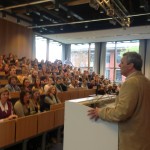
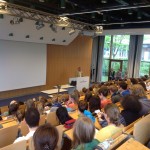
And it was good, pretty much right from the start. I speak better when there’s a little tension inside me. Keeps me focused. It’s a balance, really, between just the right degree of being relaxed and tense. I spoke of the things I always speak of. Where I come from, that world. How it was, to live in that world as a child. And how it was, to grow to the point where you wanted and desperately needed to see what was outside. A whole lot of faces, all of them, I think, were focused intently on me as I spoke. And time slid by. I glanced at my watch. I would make it through.
I read two passages that night, for the first time ever. Much of Chapter 12, about Rumspringa. And the first date scene with Sarah. That’s the one I usually read. And after the second reading, I wound it down. Opened up for questions. The part I like the most. And they came, oh, yes, they did. Boom, boom, boom, and boom again. The threads led from one point of interest to another.
And I slid it in, kind of tongue in cheek, for the first time over there. I judge a country by whether or not the Amish would be allowed to live in it in peace. They could not live here in Germany, I told the audience. Your country is not free enough. You all need to work on that. I have a lot of issues with America, primarily because it is the most murderous, warmongering country in the world. I’m as anti-war as my father ever was. More so, if that’s possible. But I deeply respect the fact that the Amish can exist there. There aren’t a whole lot of places where they’d be allowed to live as they do.
Question after question poured in, and finally Sabrina walked over to the mike. “One more question, then it’s time to close it down,” she declared. So I took one more. In Germany, they often show appreciation by clapping their open palms down on the table. As I wrapped it up, Sabrina walked to the table beside the podium, lifted her hand high, and clapped it down. No, whacked it down. Hard. The students didn’t follow her lead. They didn’t clap the desk tops before them. Instead, the whole room erupted into real clapping. And it went on and on. (It was probably only ten seconds or so, but to me it seemed a lot longer.) I stood there, smiling gratefully and a little sheepishly. I even waved a bit. Still they clapped. It was a weird moment. And a beautiful one. What a fantastic crowd. Finally I stepped back up to the mike. Thank you. Thank you. If anyone has a copy of the book they want me to sign, I will be honored. The applause slowed and died. A minute later, about twenty-five people had lined up, holding their copies of the book. I took a moment to speak to each one. Thanked them for attending. Thanked them for reading my stuff.
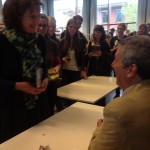
Afterward, it was out to another ancient pub, hanging with good friends, eating fantastic food and drinking a tall, tall glass of Weizen beer. That was the night the waiter rebuked me for pouring ketchup over the thin but delicious potato cakes on my plate. “No ketchup, that’s bad,” he scolded. I grinned at him and kept right on shoveling.
And the next morning, at eleven, I spoke to my last group at Leuphana. A class of probably thirty-five students. A writing class. Life writing, they called it. I sat there at a table up front, totally comfortable in jeans, shirt-jac and camo T-shirt, and just talked to them. About how it is for me, what it is to write. How it all began, right here on this blog. And how this place is where I can speak my voice right now. So that’s where I’m writing. In your story, you have to be honest about yourself, I told them. Otherwise, your narrative won’t be credible. Don’t play the innocent victim. Few are innocent. I’m sure not, in my story. After class, a few of the students lingered to chat and ask questions. And get their books signed. I was honored.
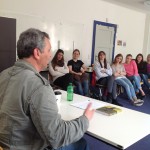
Off then, to lunch with Sabrina and her colleagues at the dining hall. We sat around a table with a few other teachers. The food was quite tasty, for cafeteria food. And then we walked over to Sabrina’s office. Maryann accompanied us. “Come with me,” Sabrina said. We walked down the hall into another office. “Mr. Wagler is here for his money,” Sabrina told the nice lady behind the desk. And the nice lady counted it out in cold, hard cash. Nine hundred Euros. Sabrina had told me that’s what I’d get. I never could understand why, quite. The University had flown me over. Put me up. Fed me. And now, this. You people really are quite mad, you know, I said. There’s no way I earned this. “It’s what we pay our Writers in Residence,” Sabrina replied. “Of course you earned it.” Writer in Residence, I thought. So that’s what I was. Writer in Residence, I said. How cool is that?
We walked back to Sabrina’s office, and I sat there, talking to her and Maryann. The next day, Thursday, was a national holiday. Ascension Day. We hadn’t quite figured out what I would be doing, but it was time to move on, I felt. I got some cash to burn here, I said. All these Euros. I can’t take them home. I have to spend them here. Maryann grinned at me. “I could go with you over to Muenster tomorrow on the train, and show you around,” she said. “I lived there for a year, way back. I know the place.”
Yes. Yes. Yes. I half-shouted. If you take me to Muenster, I’ll pay your train ticket and your hotel room tomorrow night. Then I can head on over to Mainz on Friday, and you can come back here. “I do have a presentation paper to finish before next week,” she said. Write it on the train, I told her. Take me to Muenster. Please. I don’t have the nerve to travel down there by myself. And look, I have all these Euros, I said, waving them in her face. I have to spend them somewhere. Take me to Muenster. She picked up her phone and called an old hotel she knew of close to the center of old town Muenster. And minutes later, she had two rooms booked for Thursday night. We stopped by the train station later and I bought our tickets. Muenster. I was actually going. I couldn’t quite believe it. The old city with so much history, the city that harbors the darkest and most unique stain in all of Anabaptist history.
And there was still one more adventure, there in Lüneburg that afternoon. Maria, Sabrina’s colleague, wanted to take me over the line into old East Germany. It wasn’t far, she claimed. “I want to take you. Show you what it was like.” East Germany, I thought. I definitely want to see that. And after lunch, we took off in her vehicle. Maria and Maryann and me.
And she told me how it used to be, to cross over. And what a nightmare it was to come back. She showed me the spot where the guard shack was, at the border. The border guards were always suspicious of everyone. And for any reason or none, they’d wave your car off to a side lot. And you’d wait there for hours, and they wouldn’t come. “That’s how it was,” she said. “There was nothing you could do.”
And she pointed to the bike path set way back off to right of the road, going in. “That was a dog run,” she said. “Miles and miles and miles of it. Those poor dogs ran and ran and ran endlessly up and down the runs. The dirt was packed so hard, they couldn’t do much with it. So they made a bike path.”
Maria wanted to show me an old guard tower along the river. There were two of them still standing in one area, she told me. “They tore most of them down before they realized they should leave a few. To show how it was and what it was. Still, the locals don’t like to talk about it. That part of the past they want to forget.”
And we drove around for quite a while, the three of us. We stopped and asked people. Where are the guard towers? And after recoiling a bit, the people always pointed and spoke. Over there. Such and such a street. By the river. It’s easy to find.
But it wasn’t easy to find, and we almost didn’t. In despair, we stopped and asked a farmer who stood out beside the road with his little son, collecting the mail. It was getting on to late afternoon. We had to find the tower soon. The farmer smiled and pointed. Gave specific directions. Directions that were wrong.
The tower had to be beside the river. And we kept plugging along until we found it. Kind of half following the farmer’s directions, but persistently moving toward the river. And then we saw it. A tower. Off in the distance. An evil needle of concrete and steel. A stark and brutal reminder of how it was back then, when people trapped behind that tower would be murdered in cold blood if they tried to escape. A symbol of the vile, pure evil that is the state.
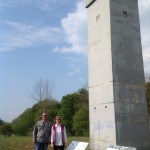
And later that evening, Sabrina picked me up, and off we went again, to one of the old town pubs. An impromptu Pub Night with a small group of the students I had spoken to in the last three days. It was the eve of a holiday weekend. So only a few showed up. We sat about and talked, like old friends. Relaxed. Drank a glass or two of beer. It was all good.
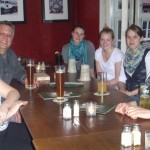
And that was my experience at Leuphana University. I’m thinking it sure would be a lot of fun to go back and do it all over again sometime.
**************************************
Next post: To Muenster and Mainz
Share














